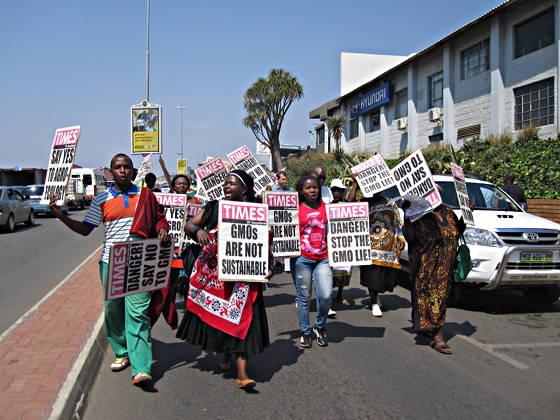Latest GM & Biosafety Resources
28 May 2018
Biosafety Indaba eSwatini: Unclear motives following approval to cultivate Bt cotton, despite dismal failures in Africa, India
The news that the Swaziland Environmental Authority (SEA) had authorised the importation and commercial release of Bt cotton seeds came as a huge shock to the African Centre for Biodiversity (ACB). It meant that ACB had to reconsider its earlier acceptance of an invitation by SEA to attend a National Biosafety Indaba on 22 May […]
READ18 October 2017
The GMO crisis in Swaziland
Swaziland is under enormous pressure to introduce genetically modified organisms (GMOs) into the country’s farming system. This pressure is coming not only from Monsanto but also from farmers and some sections of the public who have been fed a great deal of misinformation and hype by the pro-biotech machinery. The farmers, acting on incomplete and […]
READ16 October 2017
GM cotton in Africa: battleground between US and Chinese Capital
This paper provides an overview of the GM cotton push in in East and Southern Africa, within the context of the global and regional cotton markets.
READ31 July 2017
The Water Efficient Maize for Africa (WEMA) project: Real or false solution to climate change?
By Lim Li Ching, Senior Researcher, Third World Network Climate change is an urgent challenge facing farmers in Africa. As our world warms, many farmers are already experiencing devastating consequences, including storms, drought, floods, heat waves and extreme weather events. The implications for food security are severe, with the Intergovernmental Panel on Climate Change (IPCC) […]
READ22 June 2017
Regulatory Implications of New Breeding Techniques
This paper presents an evidence-based critique of the Report published by the Academy of Science South Africa (ASSAf) titled ‘Regulatory Implications of New Breeding Techniques’ (the Report). Our critique discusses the pro-GM propaganda contained in the Report and contrasts it with a well-established scientific body of concerns surrounding the use of these so-called new breeding […]
READ13 March 2017
Two simplified briefings introducing new GM technologies and biosafety risks
These reports introduce the novel techniques already being employed, or in development and their associated biosafety concerns that go against the claim that crops developed with these methods are technological progress in ‘precision’ and ‘safety’. Further described is the utilisation of RNA interference, an epigenetic process that is already being employed in commercialised crops. Despite […]
READ13 February 2017
The Bayer-Monsanto merger: Implications for South Africa’s agricultural future and its smallholder farmers
This paper explores the likely implications of an approved Bayer-Monsanto merger for the South African agricultural system. It outlines the trend of consolidation occurring within the seed and agrochemical industries, provides a background to the merger, criticises the rationale given for the merger by Bayer and Monsanto and outlines concerns should the merger be approved […]
READ15 October 2016
World Food Day – South Africa faces drought, rising food prices and false promises of GMOs
To cope with drought and rising food prices, we need to urgently move away from genetically modified food and towards indigenous African crops. So warns the African Centre for Biodiversity (ACB). “We need to urgently shift away from maize towards embracing a diversity of crops – particularly indigenous African summer grain crops such as sorghum […]
READ14 October 2016
Transitioning out of GM maize: Current drought is an opportunity for a more resilient and just food system
Coinciding with World Food Day, the African Centre for Biodiversity (ACB), in a new report titled “Transitioning out of GM maize: towards nutrition security, climate adaptation, agro-ecology and social justice” makes a compelling case for South Africa to urgently transition out of GM maize production, to systems that are socially just, ecologically sustainable and provide […]
READ2 July 2016
Genetically Modified (GM) Soya in South Africa: Status Quo Report
This briefing paper presents the status of genetically modified (GM) soya in South Africa. GM Soyabean seed owned by Monsanto and genetically engineered to withstand the herbicide glyphosate, accounts for 90% of all soya bean production in South Africa. Download the report.
READ3 April 2016
The chicanery behind GM non-commercial ‘orphan crops’ and rice for Africa
This paper focuses on research and development (R&D) relevant to non-commercial so-called ‘orphan crops’ in Africa—cassava, sorghum, sweet potato, pigeon pea and millet —as well as one commercial crop, rice. This paper should be read in conjunction with work already produced on GM banana (Schnurr, 2014) and GM cowpea (ACB, 2015). These non- commercial crops […]
READ11 November 2015
#GlyphosateMustFall
The South African government needs to ban the use of glyphosate in our food system with immediate effect. Glyphosate (most commonly known as RoundUp) is the most widely used herbicide in South Africa and its use has increased dramatically since the introduction of genetically modified maize, soya and cotton that has been engineered to survive […]
READ











